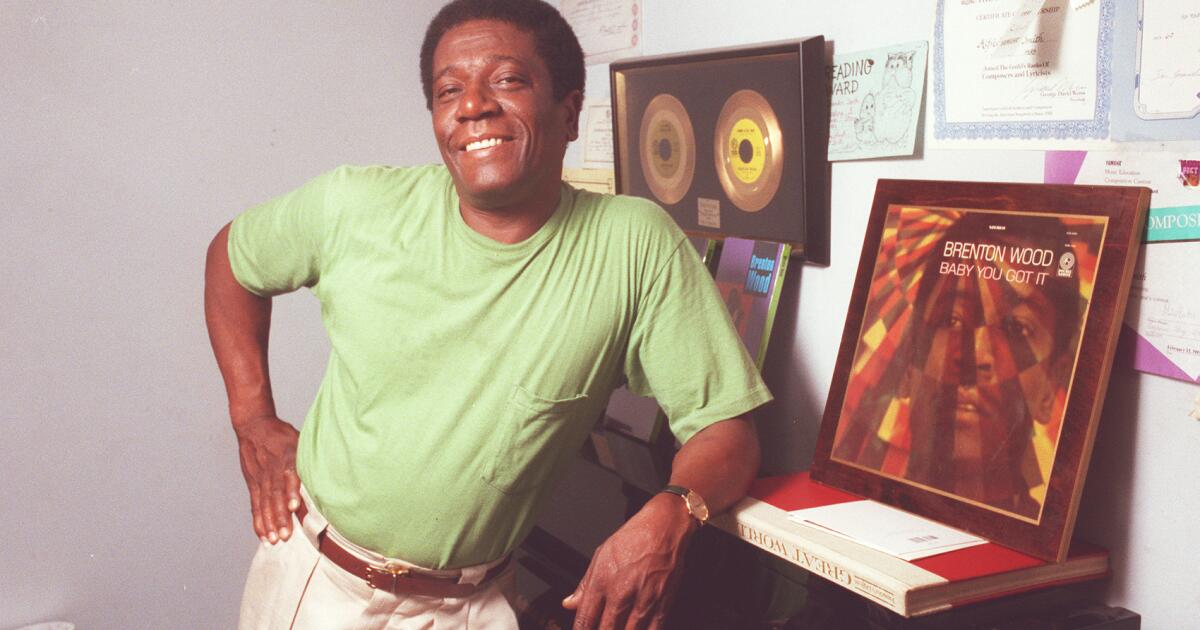Brenton Wood, crooner who captivated Latino listeners, dies


In 1967, Brenton Wood looked as if he was on the cusp of mainstream success.
The Compton crooner’s single “The Oogum Boogum Song” became a hit and ranked 34th and 19th on the Billboard’s Hot 100 and Top Selling R&B Singles charts, respectively. A few months later, Wood debuted his second hit, “Gimme Little Sign,” which peaked at No. 9 on Billboard’s Hot 100.
Wood, who was born Alfred Jesse Smith, died Friday of natural causes at his home in Moreno Valley, his manager and assistant Manny Gallegos confirmed to Variety. He was 83.
Wood’s slinky and upbeat tunes are infectious. His seductive and affable manner of describing the essence of a budding romance in layman’s terms is inviting. Whether solo or with a partner, it’s easy to groove to the beat.
Wood continued releasing tracks but none ever garnered similar success. Frustrated with the music industry, he quit for a couple of years, then inched back onto the club circuit. There, he found an audience that would sustain him for decades: Latinos.
He would play major California cities, then travel through Mexico and into Arizona before returning home. As his audience aged, Wood began to perform on themed cruises and at festivals with Chicano musical luminaries including Los Lobos, Thee Midniters and Ozomatli. Wood’s romantic oldies resonated with a new generation of lovebirds, becoming a soundtrack of Southern California life — literally, as Wood found a third career as a performer at weddings, quinceañeras and anniversary parties.
Bob Merlis, a former executive for Warner Bros. Records and co-author of “Heart & Soul: A Celebration of Black Music Style in America 1930-1975,” described the artist as a “local hero” to L.A. — a “standard bearer for the Southern California pop soul scene.”
“Nothing else sounded like them,” said Merlis, who now runs a public relations and consulting firm. “It was so different and that instrumentation is very unusual.”
“They’ve kind of picked me out of the whole batch, and they keep me going,” Wood told The Times in 1992. “I appreciate it, because if I was waiting for the big boys to call, I’d have died a long time ago.”
Wood’s lyrics captured the cat-and-mouse chase of a first love, the kind of infatuation that makes people act a fool. He encapsulated that all-too-familiar yearning to whisk away a lover to bask in their honeymoon paradise. But he also wrote about heartache — and the triumphant moment when the pain wears off.
“Latinos like to dedicate songs, and his songs are good for that,” radio veteran Art Laboe told The Times in 1992. “It’s not the big hits they like. It’s songs like ‘Take a Chance,’ ‘I Think You’ve Got Your Fools Mixed Up’ — if a girl’s having trouble with her boyfriend, she’ll dedicate that to him.”
The songwriter was born July 26, 1941, in Shreveport, La., and moved west to San Pedro when he was 3. He moved throughout L.A.’s inner cities, selling papers and fish and shining shoes until he created a career in the music industry.
Wood was 7 when a pianist mesmerized him. Without a television set at home, he spent hours at the park, watching and mimicking the performer, using two fingers to tap on imaginary keys until he got his own piano. At 10, Brenton Wood wrote his first song about a man who wanted to be a bird. It was cheerful and rhymed but lacked oomph.
He found his groove when he met his first girlfriend. Then, the words flowed out.
The Compton High School graduate enrolled at East Los Angeles College and sang in local R&B groups such as Little Freddie and the Rockets and the Quotations in the 1950s before he went solo. He took on his stage name, Brenton Wood, from the wealthy L.A. enclave of Brentwood, where a manager lived.
Wood’s “The Oogum Boogum Song” came entirely by accident. He was working the graveyard shift at Harvey Aluminum in Torrance when the melody came to him.
“It took me about six weeks, because I had to switch the verses around about a hundred times,” he told the San Diego Union-Tribune in 2000. “That was a song about fashion changes in the ’60s with bell-bottom hip-huggers and high-heeled boots and all the different styles of clothes the girls were wearing — hot pants and all that stuff.”
The bouncy track was later featured in Cameron Crowe’s “Almost Famous” and Olivia Wilde’s “Don’t Worry Darling.”
“It was one of the best feelings you could have,” Wood told Cal State Fullerton’s Titan TV in 2014.
By 1970, he founded Mr. Wood Records and produced other artists’ singles. Latino listeners were already embracing him as one of their own.
Chicano music historian Gene Aguilera recalls being “glued up” to his little transistor radio as a teen, listening to Wood’s “Gimmie Little Sign” mixed in with the Beatles and the Supremes on KRLA-AM 1110 all within an hour. Walking his neighborhood, he would hear Wood’s voice along with Thee Midniters wafting in the background, emanating from nearby parties or from lowriders cruising down Whittier Boulevard, bumping his tunes.
“Even though he wasn’t born here, he’s just forever going to be etched in our consciousness,” said Aguilera, who last saw the artist perform at a local park in Baldwin Park before the pandemic.
“His music was really accepted by East L.A. because of the slow groove he’s got, very soulful, that people from East L.A. just love.”
Vega is a former Times staff writer.





